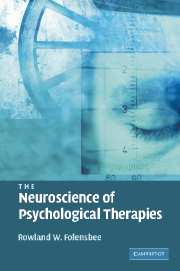Book contents
- Frontmatter
- Contents
- Acknowledgements
- 1 Introduction
- Part 1 Basic concepts
- Part 2 The process of psychotherapy
- 10 Introduction to neuroscience applications in psychotherapy
- 11 Intake and assessment
- 12 Neural networks in therapy
- 13 Affect in therapy
- 14 Memory and change
- 15 Anxiety and change
- 16 The experience of improvement in psychotherapy
- 17 The therapist's neuroscience
- 18 Communicating with clients through neuroscience
- 19 Integrating traditional therapies
- 20 Applying neuroscience to depression intervention
- 21 Neuroscience and psychotherapy: moving forward
- Appendix: Neuroimaging and psychological therapies
- References
- Index
12 - Neural networks in therapy
Published online by Cambridge University Press: 15 December 2009
- Frontmatter
- Contents
- Acknowledgements
- 1 Introduction
- Part 1 Basic concepts
- Part 2 The process of psychotherapy
- 10 Introduction to neuroscience applications in psychotherapy
- 11 Intake and assessment
- 12 Neural networks in therapy
- 13 Affect in therapy
- 14 Memory and change
- 15 Anxiety and change
- 16 The experience of improvement in psychotherapy
- 17 The therapist's neuroscience
- 18 Communicating with clients through neuroscience
- 19 Integrating traditional therapies
- 20 Applying neuroscience to depression intervention
- 21 Neuroscience and psychotherapy: moving forward
- Appendix: Neuroimaging and psychological therapies
- References
- Index
Summary
Each experience, whether current event or memory, is assumed to consist of a unique network of neurons from many parts of the brain: a neural network. Sensory systems, motor tracts, brain stem arousal systems, affect centers, hippocampal integration centers, anxiety responses, and frontal executive centers are all likely represented in a given neural network. These pieces of the neural network provide the framework through which experiences observable to the client, the therapist, and other people interacting with the client can be understood. Such experiences include the phenomena of cognition and affect, expressed behavior, shifts in attention, experience and demonstration of anxiety, and physiological responding. A specific network is likely to become active when enough of the neurons of which it is composed are stimulated at the same time. In a complementary fashion, other networks that share neurons with the network of immediate interest are likely to be triggered when enough shared neurons are simultaneously firing.
Using neural network concepts as needed
Psychotherapy cases can often be adequately represented by traditional psychotherapy theories. In such cases, interventions can be conceived and described in terms of the traditional theory being used, and neuroscience conceptualizations would be included only when they offer additional insight to the traditional theory being used. Consequently, time would not be spent helping the client develop an overall or in-depth understanding of the neural network model.
- Type
- Chapter
- Information
- The Neuroscience of Psychological Therapies , pp. 99 - 106Publisher: Cambridge University PressPrint publication year: 2007



